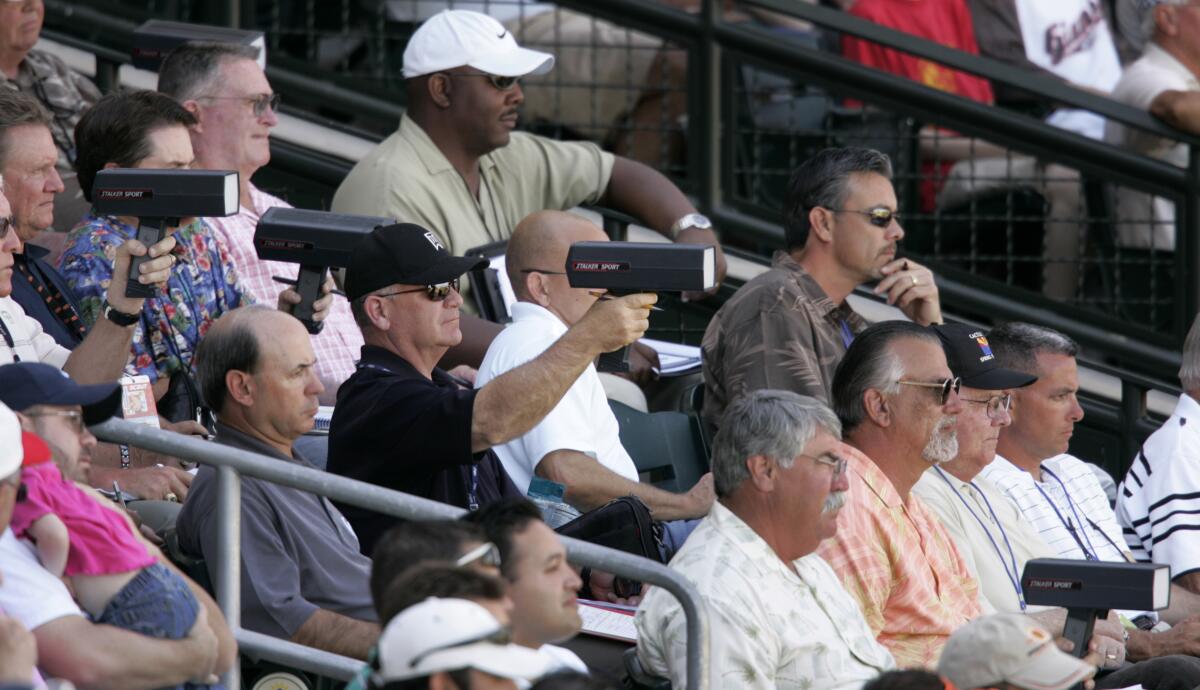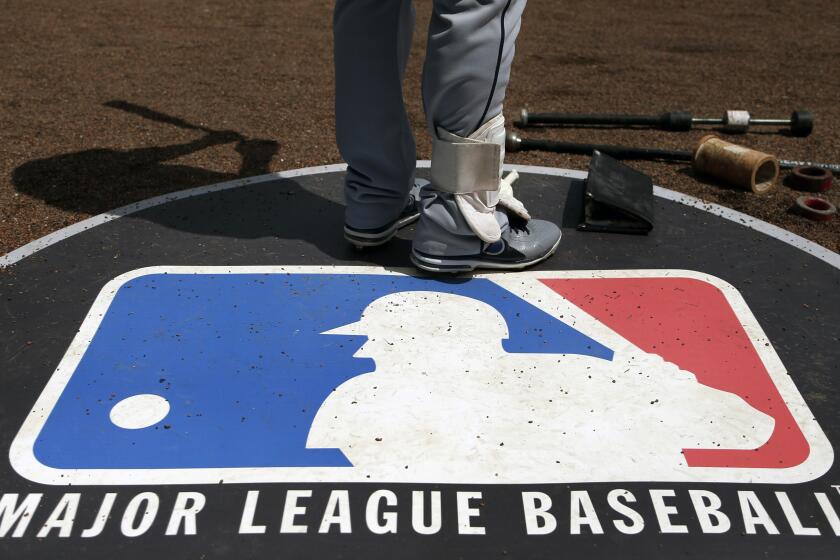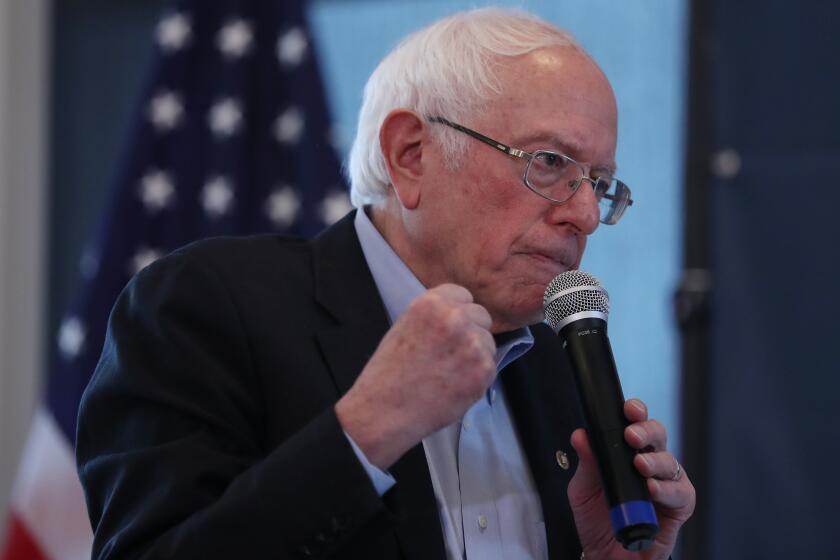Scouts sue MLB for age discrimination, claiming the league had a ‘blacklist’

- Share via
Major League Baseball “blacklisted” older scouts and used analytics and the pandemic as “pretext for coordinated and systemic discrimination based on age,” a group of formerly employed veteran scouts alleged in a lawsuit filed Wednesday.
The suit, filed in U.S. District Court in Denver, names MLB Commissioner Rob Manfred, the league office and each of the 30 major league clubs as defendants.
Robert Goodman, the lead attorney representing the scouts, said they drew “inspiration” from the minor league players who sued over violations of federal and state wage laws and settled with the league for $185 million. In this case, the suit alleges violations of the federal Age Discrimination in Employment Act and 12 states’ laws against age discrimination.
Read the federal age-discrimination lawsuit a collection of scouts have filed against Major League Baseball and each of its teams.
“We believe the commissioner and the owners colluded to eliminate veteran personnel because of salaries,” said Rick Ingalls, who helped organize the scouts into plaintiffs. Ingalls was let go by the Cincinnati Reds in 2018 after a 37-year career as a Southern California-based amateur scout, the first 20 years with the Angels.
“When Major League Baseball makes a big deal about traditions, and honoring those traditions, and then it does something like this, it’s destroying its own brand,” Goodman said. “If you’re trying to be America’s pastime and then suddenly people who have been involved in America’s pastime for 30 or 40 or 50 years are completely locked out, there is something wrong.”
The suit names 17 plaintiffs, ranging in age from 55 to 71, all but one of whom had scouted for at least 24 years. The suit asks the court to let the litigation proceed as a class action in which “over 100 older scouts” would be expected to join. If that happens, the potential liability for lost former and future wages plus damages could exceed $100 million.
Beyond the “Moneyball” trend that favored video analysts over scouts, the suit claims MLB under Manfred undertook several discriminatory actions against older scouts: first, the elimination of league notifications that a scout was no longer employed by one team and thus available for hire by other teams; second, the use of a “blacklist” to identify older scouts who should not be hired by any team; and, third, the leveraging of the pandemic as “an opportunity to terminate an entire class of older employees.”
MLB agreed to pay minor leaguers $185 million to settle a federal lawsuit that has progressed through the courts for eight years without reaching a trial.
Said co-counsel Mitch Abeita: “These guys largely haven’t provided any information that the scouts did anything wrong. All they did was get older. The law says you cannot banish someone just because of their age.”
MLB issued a statement in response to the filing.
“We do not comment on pending litigation,” the statement read. “However, we look forward to refuting these claims in court.”
Ingalls, 71, who lives in Long Beach, was 67 when he said the Reds let him go and “hired a 27-year-old kid to do my job,” he said.
He filed an age-discrimination suit against the team that was resolved out of court. He began taking Social Security payments and the pension he accrued earlier in his career — most teams have discontinued pension plans during the last decade — and says he is “actually OK” financially.
But the more stories he heard of scouts in their mid-50s and older who were let go without the safety net he had, the more he worked to organize them as a group and to spearhead an effort to recoup their financial losses.
“These guys, when they’re let go, they’re not given a year of severance, they have no health insurance, no paycheck,” Ingalls said. “A lot of guys who are 55-60 when they’re fired can’t take pensions without penalties until they’re 65. They can’t get Social Security until they’re 62. They have no health insurance.
“A lot of these guys who we’re fighting for are losing their homes. They have kids, and the cost of [health] insurance is off the charts.”
For MLB, cutting scouts and minor league teams makes good business sense. That financial move has a human toll, giving Bernie Sanders a popular cause.
Chris Smith, 64, spent the final 18 years of his 30-year scouting career with the Dodgers before being let go in 2020. Smith also filed an age-discrimination suit that was resolved out of court, then joined with Ingalls in gathering scouts to pursue legal action.
“It became painfully obvious what was going on as an industry,” said Smith, who managed in the Angels minor league system and coached at Loyola Marymount before joining the scouting ranks. “It just happened again and again and again.
“We all understand that there are changes when there is a regime change, but I’ve been in the business for 40 years, and I’ve never seen anything close to this. … The term they used was a ‘natural reduction in workforce.’
“This was not a natural reduction in workforce. This was, ‘You’re all gone.’ That, in itself, is a problem.”
The cover of the Loyola Marymount baseball yearbook says most of what you need to know about the school’s relationship with first-year Coach Chris Smith.
Major league teams still employ scouts in the post-”Moneyball” era, but the essence of the lawsuit is that what was billed as a drive for efficiency and streamlining was used as a fig leaf for disposing of older and higher-salaried scouts.
Scouts who work for decades often sign short-term contracts, renewable at the team’s discretion every year or two. Their highly specialized skills do not easily translate to other industries.
“There’s a group of guys who got let go who were 65 or older — they had to alter their plans, but they’re at retirement age and better off,” Smith said. “But what about this group of guys who are 55-58 with 30-35 years in this industry? What are you gonna do? And there’s a bunch of them like that.
“This is all they’ve done for 30-35 years, and now they’re out on the streets. They have no insurance in a pandemic. Some teams gave severance packages, some did not. Financially, there needs to be some compensation for a guy who was making a decent living and is now driving a school bus.”
Rick Ragazzo, 63, spent two decades of his 34-year scouting career with the San Francisco Giants and another decade in Los Angeles, as vice president of pro scouting/player personnel under former Dodgers general manager Ned Colletti.
“We believe the commissioner and the owners colluded to eliminate veteran personnel because of salaries.”
— Veteran scout Rick Ingalls
He was at the end of his fifth year as a major league scout for the Atlanta Braves when he said general manager Alex Anthopoulos and then-assistant GM Perry Minasian — now the Angels’ general manager — told him “they didn’t need pro scouts,” Ragazzo said. “They dissolved the department. They blamed it on COVID.”
Struggling to find another job in baseball, Ragazzo, a longtime Leona Valley resident, started his own management consulting company “just to survive,” he said.
He opted to begin taking his pension at age 62, forfeiting the extra $1,500 a month he would have made had he waited until 66½. He dipped into his 401(k) savings to pay college tuition for three of his four kids and for health insurance premiums for his family.
“It’s kind of hard to reinvent yourself at 60,” Ragazzo said, “when you’ve spent 30-plus years in a career.”
More to Read
Go beyond the scoreboard
Get the latest on L.A.'s teams in the daily Sports Report newsletter.
You may occasionally receive promotional content from the Los Angeles Times.














